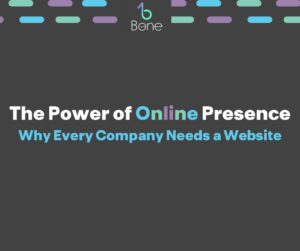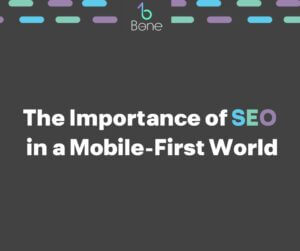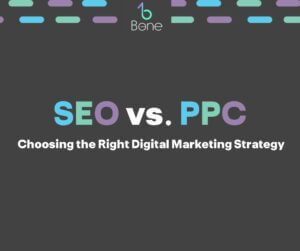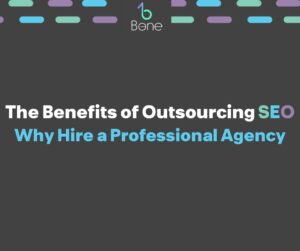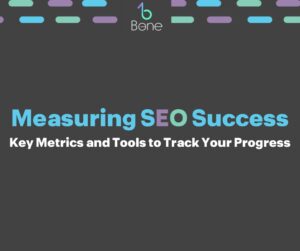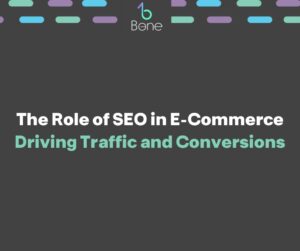When it comes to digital marketing, two of the most popular strategies are Search Engine Optimization (SEO) and Pay-Per-Click (PPC) advertising. Both approaches have their merits and can be effective in driving traffic and achieving marketing goals. Let’s explore the differences between SEO and PPC and how to choose the right strategy for your business.
Search Engine Optimization (SEO):
SEO involves optimizing your website and its content to rank higher in organic search engine results. Here are some key aspects of SEO:
a. Cost: SEO is typically considered a long-term investment and requires ongoing efforts. While the initial cost may be lower compared to PPC, it requires consistent optimization and content creation.
b. Traffic: SEO aims to increase organic search traffic to your website by targeting specific keywords and improving your site’s visibility. It can take time to see significant results, but once you achieve higher rankings, the traffic can be more consistent and sustainable.
c. Credibility: Organic search results are seen as more trustworthy by users compared to paid ads. Ranking well organically can enhance your brand’s credibility and authority.
d. Long-term benefits: With SEO, you’re working to improve your website’s overall visibility and user experience. As a result, you can enjoy long-term benefits even if you reduce your SEO efforts in the future.
Pay-Per-Click (PPC) Advertising:
PPC involves running paid ads on search engines or other platforms. Here are some key aspects of PPC:
a. Cost: PPC provides immediate visibility, but it can be more expensive compared to SEO since you pay for each click on your ads. The cost per click varies based on factors like competition and keyword relevance.
b. Traffic: PPC can generate immediate traffic to your website as soon as your ads are set up and approved. It’s a useful strategy for time-sensitive promotions or new product launches.
c. Control and targeting: PPC platforms offer precise targeting options, allowing you to reach specific demographics, locations, or interests. You have control over your ad copy, landing pages, and budget.
d. Testing and optimization: PPC campaigns provide data that can be analyzed and optimized for better performance. You can quickly adjust your strategies, test different ad variations and track conversions.
Choosing the Right Strategy:
To determine whether SEO or PPC is the right strategy for you, consider the following factors:
Budget: Assess your budget and evaluate the short-term vs. long-term impact. PPC can provide immediate results but can be costly in the long run. SEO requires ongoing efforts but can yield sustainable results.
Goals: Clarify your marketing goals. If you need quick traffic or want to promote a specific event, PPC might be a better fit. If you aim to build organic visibility and establish credibility, SEO is a good choice.
Competition: Evaluate the competitiveness of your industry and target keywords. If your niche has intense competition and high-cost keywords, it might be more cost-effective to start with SEO and complement it with targeted PPC campaigns.
Timeline: Consider your timeline for results. SEO is a long-term strategy that requires patience, while PPC can deliver immediate traffic. Align your strategy with your desired timeline and expectations.
In many cases, a combination of SEO and PPC can be an effective approach. SEO provides long-term benefits, while PPC offers immediate visibility. Regularly assessing your goals, budget, and competition will help you determine the right balance between the two strategies for your business.
SEO and PPC advertising are two distinct digital marketing strategies, each with its own benefits and considerations. By comparing and contrasting these approaches, businesses can make an informed decision based on their specific marketing goals and budget.
SEO Services in Egypt
-
Benefits of SEO:
- Cost-effectiveness: SEO can be more cost-effective in the long run as organic search rankings don’t require direct payments for clicks.
- Credibility and trust: Higher organic rankings can enhance a brand’s credibility and trustworthiness, as users perceive organic search results as more reliable.
- Sustainable traffic: Once a website achieves higher organic rankings, it can attract consistent and sustainable traffic without ongoing payments.
- Long-term results: SEO efforts focus on improving a website’s overall visibility and user experience, which can lead to long-term benefits even with reduced optimization efforts.
- Brand exposure: SEO helps increase brand visibility as websites ranking higher in organic search results tend to receive more exposure.
-
Considerations of SEO:
- Time-consuming: SEO is a long-term strategy that requires consistent efforts and time to see significant results. It involves tasks like keyword research, content optimization, link building, and technical improvements.
- Uncertainty: Search engine algorithms constantly evolve, and SEO rankings can fluctuate, requiring businesses to adapt their strategies and keep up with industry best practices.
- Competition: Depending on the industry and target keywords, competition for top organic rankings can be fierce, requiring more time and resources to outrank competitors.
- Limited control: While SEO provides overall website optimization, it doesn’t offer precise control over when and how your website appears in search results.
-
Benefits of PPC Advertising:
- Immediate visibility: PPC campaigns can generate immediate visibility and drive traffic to a website as soon as the ads are set up and approved.
- Targeted reach: PPC platforms offer precise targeting options, allowing businesses to reach specific demographics, locations, or interests.
- Control over budget and ad copy: With PPC, businesses have control over their ad copy, landing pages, and budget. They can set daily or monthly spending limits and adjust bids as needed.
- Data-driven optimization: PPC campaigns provide valuable data and insights, enabling businesses to analyze performance, test different ad variations, and optimize for better results.
- Flexibility: PPC allows businesses to launch time-sensitive promotions, target specific events, or adjust strategies quickly based on market trends or business needs.
-
Considerations of PPC Advertising:
- Cost: PPC can be more expensive compared to SEO since businesses pay for each click on their ads. The cost per click varies based on factors like competition, keyword relevance, and targeting options.
- Ongoing investment: To maintain visibility and traffic, businesses need to allocate a continuous budget for PPC campaigns. Once the budget is exhausted or campaigns are paused, the traffic stops.
- Ad fatigue: Over time, users may develop “ad blindness” and become less responsive to paid advertisements, leading to diminishing returns if the ad creative and targeting are not refreshed regularly.
- Learning curve: Managing PPC campaigns effectively requires knowledge of the platforms, keyword research, ad creation, bidding strategies, and ongoing optimization. It may take time to learn and master these skills.
Choosing the Right Approach: To determine which approach aligns better with marketing goals and budget, consider the following factors:
- Goals: Clarify the desired outcomes and timeframe for results. If immediate visibility, conversions, or time-sensitive promotions are crucial, PPC may be suitable. For long-term brand visibility, credibility, and sustainable traffic, SEO is a better fit.
- Budget: Assess the available budget and evaluate the short-term vs. long-term impact. SEO requires ongoing efforts but can provide cost-effective, sustainable results. PPC offers immediate visibility but requires continuous investment.
- Competition: Evaluate the competitiveness of the industry and target keywords. If the competition is intense or keywords are highly competitive and expensive, starting with SEO and complementing it with targeted PPC campaigns can be a cost-effective approach.
- Control and flexibility: Consider the level of control and flexibility required. PPC allows precise targeting and immediate adjustments, while SEO provides more overall website optimization and credibility-building.
- Data and analysis: Determine the importance of data-driven optimization. PPC campaigns provide more granular data, allowing for quick adjustments and testing. SEO requires monitoring key metrics over time and adapting strategies accordingly.
In many cases, combining SEO and PPC can be a powerful strategy. SEO provides long-term benefits, while PPC offers immediate visibility and targeted reach. Assessing goals, budgets, competition, control needs, and data analysis requirements will help determine the right balance between the two approaches for optimal results.
Digital Marketing SEO

